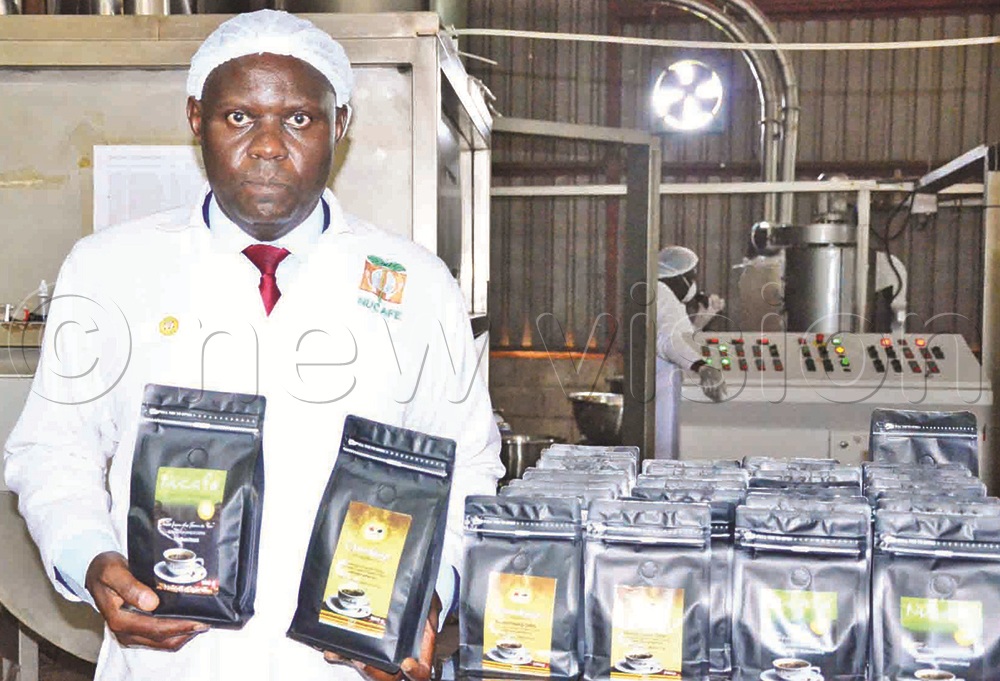Farmers to get coffee shamba management skills
Nkandu says the session will cover key aspects of coffee shamba management, including land preparation, seed selection, planting, maintenance and harvesting.
A farmer in his coffee nursery. Provide temporary shade for the seedlings for better growth. (File photos)
________________
In the 1960s, the phrase “aguze emwanyi zabala” became popular in Masaka, Kalungu and Mpigi districts — referring to farmers who bought new household items, especially motorcycles, after selling their coffee.
Medium-scale farmers often bought 100cc bikes or the powerful 250cc BSA pronounced as ‘byese’ by locals, while large-scale farmers went for cars such as the Volkswagen Beetle or Morris Minor, according to Emmanuel Kibirige, a coffee farmer.
Kibirige grows the crop on over four acres and is also the chairperson of the farmers’ committee of Kammengo Organic Farmers Association (KOFA), Mpigi.
Although the coffee sector was hit hard by coffee wilt disease in the 1990s, the tradition of coffee-fuelled prosperity is making a comeback in Greater Masaka, thanks to efforts by farmers, the Government and the Buganda kingdom’s Mwanyi Telimba campaign.
Launched by Katikkiro Charles Peter Mayiga about five years ago, the campaign encourages farmers to renovate old coffee shambas and plant new trees.
Coffee is Uganda’s top agricultural export. A May 2025 report by the agriculture ministry shows that Uganda is Africa’s leading coffee exporter, with about 1.7 million households growing the crop in 100 districts.
The central region, particularly Masaka, leads in production, followed by western Uganda, as well as eastern Uganda, especially Bugisu, Busoga and Bukedi sub-regions.

An agriculture ministry report shows coffee is Uganda’s top agricultural export.
The crop is also grown in northern Uganda, particularly in Lango and Acholi sub-regions, as well as West Nile.
Upcoming Buwama training
To help farmers to adopt best practices for the crop, Vision Group, under the Best Farmers competition, will have a training on September 27.
The training will take place in Buwama district, central Uganda and will be facilitated by Joseph Nkandu, a seasoned coffee farmer.
Nkandu says the session will cover key aspects of coffee shamba management, including land preparation, seed selection, planting, maintenance and harvesting.
“Land selection is critical. A poor choice leads to poor yields, while good land sets the foundation for a productive farm,” he explains.
Farmers will also be briefed on new European Union (EU) environmental regulations, which prohibit the importation of coffee grown on deforested land.
“We’ll have experts explaining these requirements and how farmers can comply,” Nkandu adds.
The training is open to all coffee farmers, both new and experienced. No official transport is provided, so participants are expected to arrange their own travel.
Coffee growing tips
Land preparation
- Choose gently sloping, fertile, well-drained soils (pH 5.5–6.5)
- Clear rocks, roots and weeds; terrace slopes to prevent erosion
- Dig 60cmx60cm holes three months before planting, mix topsoil with 10kg of organic manure and refill two months before planting
- Recommended spacing: Robusta — 3mx3m (450–500 trees per acre)
- Intercrop with bananas or legumes to improve soil fertility and provide shade
Planting
- Plant at the start of the rainy season (March or September).
- Use disease-free clonal KR plantlets or healthy local seedlings
- Water seedlings before and after planting; provide temporary shade.
- Plant shade trees such as albizia or grevillea at 60ft intervals.
Maintenance
- Prune regularly to improve airflow and reduce disease risk.
- Train plants at 1.5ft height (6–9 months) to encourage branching.
- Apply organic fertilisers based on soil tests.
- Monitor for pests such as coffee berry borer and diseases such as leaf rust.
- Use mulch to conserve moisture and suppress weeds.
Directions - From Kampala, drive to Buwama town, then turn left towards the crocodile farm and continue to Bunjako on the lakeshore.
- From Masaka, turn right at Buwama and follow the same route. For more information, contact 0789353585.